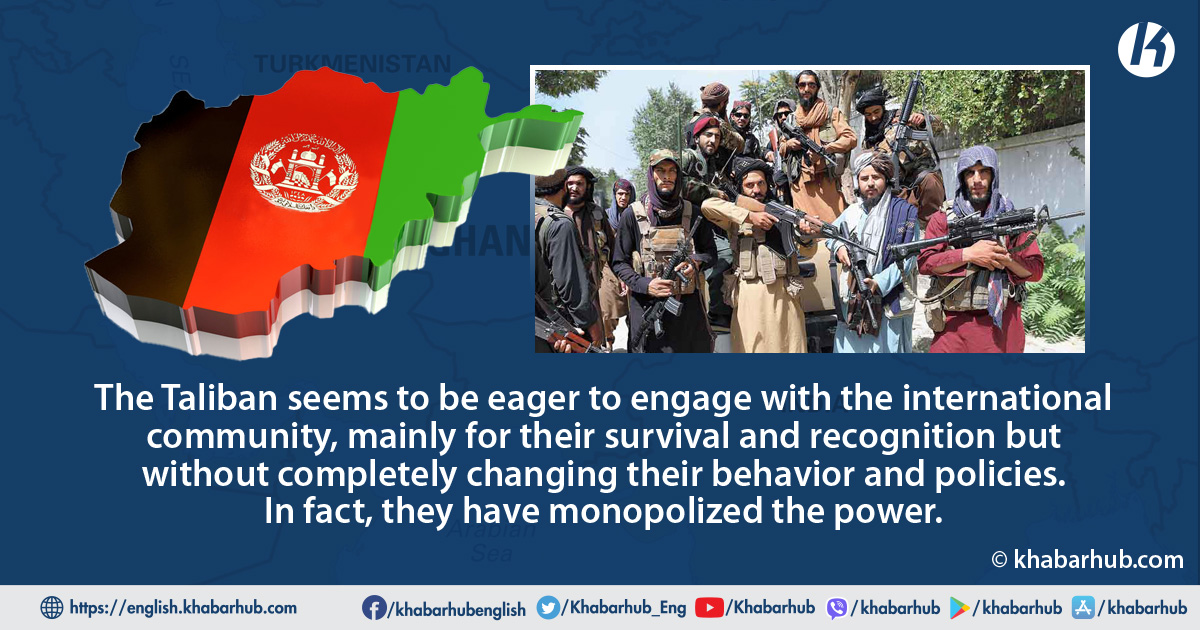KATHMANDU: Afghanistan is treading on a disastrous path that leads to a bleak future. In fact, it was predictable that Afghanistan would face a disaster within a year of Taliban rule.
Taliban militants seized the capital Kabul and major Afghan cities amid the abrupt and chaotic withdrawal of the U.S.-led international coalition forces in August 2021.
Taliban’s monopolization of power suggests that they are not prepared to convert themselves into a moderate political force or movement in Afghanistan. Their hollow promises perturbed the Afghans and the international aid dwindled to almost a trickle in one year of their rule.
This is evident that the Taliban militants do not possess the ability to govern the country both politically or economically but can only rule the country with their brutal repression, fear and widespread human rights abuses.
The Taliban seems to be eager to engage with the international community, mainly for their survival and recognition but without completely changing their behavior and policies. In fact, they have monopolized the power.
Taliban rule has undoubtedly provided a safe haven for global jihadist groups, regional terrorist outfits and criminal gangs. The group’s nexus with international terrorist groups, militant outfits, narcotics drug traffickers and criminal networks is growing each day.
The Taliban is likely to face several resists and multiple wars within the country in the next few months. Ethnic minority groups in Afghan’s North are intensifying their efforts to lunch an insurgency against Taliban militant rule.
Taliban’s ruling style has not only provided a transnational terrorist base but has also raised serious fear that such terrorist outfits could gain the capability on making international terrorist attacks.
Lately, the Taliban have proved to be incapable and incompetent to provide good governance, security and economy, which can instigate a new cycle of a violent campaign in Afghanistan.
Unfortunately, the Taliban are yet to abandon their deep-rooted connections with al-Qaeda, an international terrorist outfit that celebrated the victory of the Taliban’s chaotic takeover of Afghanistan on the eve of the 20th anniversary of the 9/11 terrorist attacks.
U.S. drone strike killed al-Qaida chief Ayman al-Zawahiri on July 31, 2022, in what had been called a ‘safe house’ in the heart of Kabul, Afghanistan.
This incident confirmed that the Taliban had provided sanctuary to the 9/11 terrorist attack mastermind Al-Zawahiri. It was clear evidence that the Taliban’s senior-most leadership had been giving protection to the al-Qaeda-chief.
Afghanistan under Taliban rule is likely to breed ground for international terrorist organizations, which could allow a base for tragic terrorist attacks in foreign soils.
Moreover, al-Qaeda, which is a long-term threat to regional and global security, is quietly trying to reorganize its central core leadership by making fresh recruitments, and enhancing its logistic and financial capabilities to mount terror plots.
This has raised a serious security problem in the entire region. Moreover, the Taliban takeover in Afghanistan could inspire the rise of other militant outfits that can lead to the escalation of violent attacks within Pakistan. Al Qaeda’s South Asian branch- al-Qaeda in the Indian Sub-Continent (AQIS) has long been planning to target India.
On the other hand, Islamic State (IS), which was defeated by the US-led international coalition in July 2017 with a complete takeover of its large swaths of territory in Iraq, Syria, Libya, and Afghanistan, among other countries, is thriving in Afghanistan.
IS central operational ability was weakened following the United States’ special military operation ‘Operation Kayla Mueller’ which eliminated the group’s chief Abu Bakr al-Baghdadi (self-proclaimed as the Caliph) on October 26, 2019, in Barisha of north-west Syria.
Islamic State of Khorasan Province (ISKP) has seen a resurgence with frequent brutal terror attacks in and around Afghanistan.
ISKP, an Afghanistan affiliate of the self-proclaimed Islamic State Group has carried intensified multiple terror atrocities in Afghanistan and neighboring countries.
ISKP claims it is currently capable to mount terror attacks outside Afghanistan. And if it happens, it can pose a new broader security crisis in the Central and South Asian countries.
ISKP takes advantage to undermine its enemy Taliban which has long been close ties with al-Qaeda’s central, key strategic rival as well as with the Islamic State across all countries.
Islamic State and Al Qaeda are the deadliest global terrorist groups but they are rivals as both these outfits want to dominate their own version of global jihad projects.
International terrorism threats have become increasingly complex due to widely available end-to-end encryption communication means, and easy technology exploitation, message campaigns through multiple social media platforms, among other means to avoid detection.
ISKP has fought seven times, including several direct battles, bombing campaigns as well as targeted attacks against the Taliban.
Now ISKP has been trying to take new advantage or to demonstrate its operational ability to undermine the Taliban’s rule in Afghanistan.
The ISKP recruits its fighters from Afghan ethnic Pashtuns and central Asian multiethnic militants. Former Afghan security and intelligence personnel could have supported ISKP to resist Taliban rules like in Iraq and Libya.
The Taliban is likely to face several resists and multiple wars within the country in the next few months. Ethnic minority groups in Afghan’s North are intensifying their efforts to lunch an insurgency against Taliban militant rule.
If the Taliban increases its presence to counter the internal insurgency, ISKP won’t miss their chance to strengthen its organization.
The ISKP, which has waged a continued struggle for existence since it was founded in 2014, will prove a weak force to control the territory on the basis of a conventional war with the Taliban.
Despite weak coordinated attacks, ISKP can multiply their multi-pronged approach to thrive in the region.
The ISKP has already started expanding its presence beyond Afghanistan, and its aggressive propaganda campaign potentially attracts more militants from South Asian and Central Asia to Middle Eastern countries. ISKP may have been able to establish small cells in some of the regional major cities.
The ISKP has several Telegram channels to target several counters that have already started in different local languages intending to target different countries in Central and South Asian countries.
The country’s ability to combat terrorism cannot be strengthened without strong financial regulations and implementing strong policies.
The outfit has already launched several attacks in Afghan neighboring countries such as Pakistan, Tajikistan and Uzbekistan. Despite ISKP’s aggressive reemergence threats in the region, no concerted counter-terrorism efforts have been made.
Meanwhile, Islamic State cyber activities suggest that India is facing terror threats in the future.
ISKP channels have also been circulating anti-Hindu propaganda in recent weeks which is not only targeted at India but can also be a potential threat to Nepal.
The ISKP uses propaganda as an instrumental tool for its recruitment process. It even formulates strategies to attract new recruits from Indian individuals for its ranks.
International terrorism threats have become increasingly complex due to widely available end-to-end encryption communication means, and easy technology exploitation, message campaigns through multiple social media platforms, among other means to avoid detection.
Keeping all these in mind, terrorism threats from Afghanistan could slowly destabilize the regional security situation.
Transnational terrorist groups could penetrate the border of regional countries as part of their plans to make brutal attacks in other countries.
All South Asian countries, including Nepal, need to be extremely vigilant over any suspected terrorist activities and possible terrorist threats.
Nepal is in a vulnerable position that could fall into the international grey list due to its failure to control money laundering and terrorist financing standards.
The increasing risk of terrorism threats in Nepal in view of the growing rise of terrorist activities in South Asia and beyond can be disastrous.
The country’s ability to combat terrorism cannot be strengthened without strong financial regulations and implementing strong policies.
Global terrorist outfits can even exploit a country like Nepal that faces rampant corruption, manipulation of middlemen, and flow of illicit finance in business and inabilities in the criminal justice system.
Nepal has been facing many legal, technical, operational, and resource challenges to counter terrorism threats.
Since Nepal shares over 1,850 km open border with India’s five states – Sikkim, West Bengal, Bihar, Uttar Pradesh, and Uttarakhand, its security forces need to be extremely vigilant when it comes to activities of terror outfits such as ISKP or other international terrorist groups over the potential use of Nepali territories against India or pose other types of terrorist threats internally.
Nepal must beef up counter-terrorism mechanisms and increase its monitoring capabilities of terrorist activities, and money laundering, among others.
This tiny South Asian Himalayan country has no multi-agency approach to counter terrorism threats that could misuse Nepal’s land against India.
Nepal’s money laundering office is largely used for political purposes rather than carrying out the real job of combating the financing of terrorism.
Nepal is in a vulnerable position that could fall into the international grey list due to its failure to control money laundering and terrorist financing standards.
Unfortunately, there has been widespread confusion among Nepal’s law enforcement agencies about global terrorist threats as well as terrorist financing.
Financial Action Task Force (FATF) and Asia Pacific Group (APG) did not find any satisfactory progress on the institutional outcomes and effectiveness except for gaining a warm welcome from top government officials and a welcome dinner with Nepal Police band music and a lot of hollow commitments.
During their two-week-long field assessment performance in Nepal, they experienced that most of Nepal’s prosecuting agencies are not able to prosecute middlemen and ‘big fishes’ in the country.
Nepal government’s own report has acknowledged several weaknesses but has not taken significant action against terror financing.
The country has submitted hundreds of documents to show its performance but irregularities continue within the monitoring organization due to deep institutional corruption practices.
Unfortunately, there has been widespread confusion among Nepal’s law enforcement agencies about global terrorist threats as well as terrorist financing.
Over 15 laws have been identified as weak but due to the unstable political landscape, widespread corruption and growing power, a handful of middlemen can manipulate the authorities for their profit motive, which could lead to the terrorism threat.









Comment